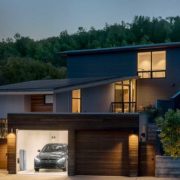Mercedes-Benz battery takes on Tesla’s Powerwall with Vivint Solar power
May 19 2017 The New York Times

by Diane Cardwell
Vivint Solar, a leading provider of residential rooftop systems, has tried many things over the years to gain an edge on the competition.
Now it is hoping that offering customers a Mercedes-Benz for $US5000 ($6740) to $US13,000 will do the trick.
But the offer is not for a car from the German automaker.
Instead, it is for a sleek battery the size of a mini-fridge that will allow homeowners to take better advantage of the energy their solar power systems produce, whether to cut costs or to maintain a steady source of electricity during power failures.
Mercedes has been selling the batteries in Europe and South Africa this year, but its partnership with Vivint, announced on Thursday US time, represents its entrance into the United States market.
The combination, said Boris von Bormann, chief executive of Mercedes-Benz Energy Americas, will allow customers “to take the next step toward a sustainable energy future.”
To the companies, along with rivals like Tesla and other solar installers that have joined forces with battery providers, that future involves tracts of software-enabled homes with solar panels on their roofs feeding batteries that can charge electric vehicles and power lighting and appliances at times when drawing from the grid is costliest.
In some states, like California, where Mercedes and Vivint will first focus their efforts, the economic equation is beginning to make sense, investors and analysts say.
But in many other states, potential customers may be driven more by emotion — like feeling environmentally responsible or self-sufficient — than by cost savings.
“Everybody’s adding an energy-storage offering one way or another,” said Shayle Kann, who leads GTM Research, which tracks the solar industry. “Solar plus energy storage at the residential level is almost definitely the future, but it isn’t yet the present.”
For solar companies, battery storage may provide a lift in a market whose dizzying pace of growth has suddenly slowed, especially for leading installers like SolarCity and Vivint, which both reduced their installation estimates amid corporate upheaval, and Sungevity, which went bankrupt.
At the same time, policy changes and proposals reducing incentives in Arizona, Indiana and other states have dimmed the prospects of rooftop solar.
And in two leading markets — California and Hawaii — new rates, incentives and rules are pushing customers to obtain batteries along with the solar panels.
For the car makers, adding solar to the mix allows them to market themselves and their electric vehicles as even more environmentally friendly.
“The electric-car story is good — it’s better than internal combustion from an environmental point of view — but electric cars powered by solar: That’s kind of nirvana from an environmental perspective,” said Karl Brauer, executive publisher of Autotrader and Kelley Blue Book.
Although customer adoption of electric cars has been slow, the industry is poised to accelerate, with additional lower-priced, longer-range cars on the horizon, Mr Brauer said.
And although Mercedes is mainly a luxury brand in the United States, offering a home power system allows the company to tie itself to environmentally friendly cars in general, and to position itself as being “not just about the car but the entire infrastructure that supports the car,” Mr Brauer said.
At Vivint Solar, said David Bywater, the chief executive, surveys indicated that at least half of the company’s customers were looking for storage along with their solar arrays.
“We think with this ecosystem and how it’s evolving, this is a crucial component,” he said.
Mr Bywater met Mr von Bormann at the beginning of the year at the Consumer Electronics Show in Las Vegas, and the partnership grew from there.
The battery systems are made up of 2.5-kilowatt-hour modular batteries that can be combined in systems up to 20 kilowatt-hours, enough to run a typical refrigerator for a week.
Vivint plans to use its regular sales force, which largely goes door to door, to market the batteries. Mercedes has no plans to offer Vivint solar systems through its car dealerships, Mr von Bormann said.
Sorece:Mercedes-Benz battery takes on Tesla’s Powerwall with Vivint Solar power




